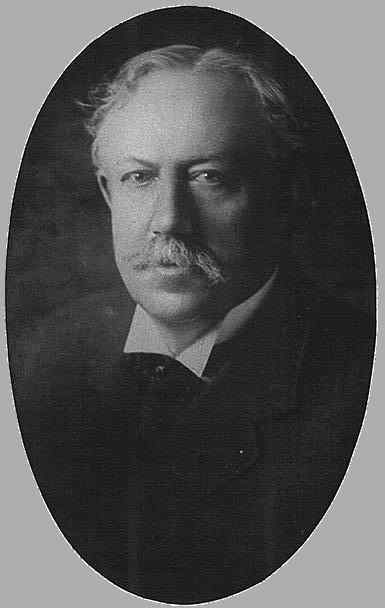
In writing Fossil Friday/Answer Monday posts for the Science League of America, I don’t usually expect to discover fodder for historical posts. So it was a bit of a surprise to find, while composing a recent post asking readers to identify the provenance of a lovely specimen of Vinctifer comptoni from the Santana Formation of Brazil, a widely circulating mistake about David Starr Jordan’s involvement with the Scopes trial. V. comptoni, you see, was originally described as Aspidorhynchus comptoni by Louis Agassiz; it was relocated to Vinctifer by Jordan, a leading ichthyologist of his day, when, as I wrote, “he wasn’t frittering away his time as president of Indiana University or Stanford University.” As I was writing, I was sure that he served as president of Stanford University, but I wasn’t positive offhand about where his previous university presidency was, so I checked the entry for David Starr Jordan (right; 1851–1931) at Wikipedia.
There, to my astonishment, I found, “In 1925 Jordan was an expert witness for the defense in the Scopes Trial.” Even without consulting any sources, I was sure that it wasn’t so. But to be doubly sure, I checked in Edward J. Larson’s Pulitzer-Prize-winning Summer for the Gods (1997), which lists the eight scientists whose testimony (with the exception of Metcalf’s) was not heard in the courtroom but included in the record of the trial: Fay Cooper Cole, Charles Hubbard Judd, and Horatio H. Newman, all from the University of Chicago; Winterton C. Curtis, from the University of Missouri; Jacob G. Lipman, from Rutgers University; Kirtley F. Mather, from Harvard University; Maynard M. Metcalf, from the Johns Hopkins University; and Wilbur (whom Larson mistakenly called Hubert) Nelson, the state geologist of Tennessee, “who[m] the defense added to its witness list after Bryan began criticizing its reliance on out-of-state experts.” No Jordan.
Cited in the Wikipedia entry as authority for Jordan’s serving as a scientific expert witness in the Scopes trial was a description of a collection of Jordan’s papers at Swarthmore College, according to which, “He served as an expert witness on the validity of the theory of evolution at the Scopes trial in Tennessee, for example.” I promptly dropped the archivist a friendly note, urging a correction (it’s now corrected). But I found that the mistake is astonishingly prevalent. Thomas C. Leonard’s Illiberal Reformers (2016), Scott L. Montgomery and Daniel Chirot’s Four Big Ideas and How They Made the Modern World (2015), Andrew Hacker and Claudia Dreifus’s Higher Education? (2010), the Dictionary of Modern American Philosophers (2005), edited by John R. Shook, and Neil Baldwin’s Henry Ford and the Jews (2002) are all recent books from reputable publishers that claim that Jordan testified on Scopes’s behalf in Dayton.
It’s hard to identify the original source of the error, but Larson’s Summer for the Gods itself may be responsible. While quoting a dismissive remark of Jordan’s about traditional Protestant revivalism, Larson described Jordan as “an eminent evolutionary biologist who later volunteered to aid in the legal defense of John Scopes.” There is no error here: Jordan was recruited by the ACLU to serve on a Tennessee Evolution Case Fund advisory committee, which helped to raise money for Scopes’s defense. (He was also later recruited by the scientific expert witnesses to chair a committee to raise funds for Scopes to pursue graduate training in geology at the University of Chicago after the trial ended.) But helping to raise funds and testifying in a courtroom are both forms of aiding in someone’s legal defense, and careless readers of Summer for the Gods might have confused the two. But if you see a pre-1997 example of the mistake, let me know!
To be sure, Jordan would have been a fine witness for Scopes. A leading biologist of his day who served as president of Indiana University and founding president of Stanford University, a former president of the National Education Association, and a prolific author, Jordan had the credentials and recognition; and (in part through his involvement with Maynard Shipley’s Science League of America) he was already active in the effort to repel antievolutionist assaults on the teaching of evolution. In late May 1925, The New York Times published a tentative list of expert witnesses for the defense in the Scopes trial, in which Jordan, along with Edwin G. Conklin of Princeton University, was listed as a prospective expert in zoology. (It was a long, ambitious, eclectic, and sometimes strange list—the paleontologist Henry F. “Osborne” [i.e., Osborn] of the American Museum of Natural History was listed, oddly enough, as a prospective expert in archaeology.)
Why wasn’t Jordan slated to testify, then? Larson blames the reputation of Clarence Darrow, who agreed to join the defense in early June 1925. Writing of “[t]he best-known potential experts for the defense,” including Jordan and Osborn, Larson says, “They seemed more troubled about appearing at the trial with Darrow than against Bryan. Certainly none of them liked appearing in a supporting role opposite a showman such as Darrow. The Chicago attorney’s radical agnosticism made some of them uncomfortable as well.” Further, he adds, they were all enthusiastic eugenicists—Jordan wrote a book with the appalling title The Human Harvest: A Study of the Decay of Races through the Survival of the Unfit (1907)—while Darrow was fiercely opposed to eugenics. (Yet would that have been a difficulty when eugenics was not at issue in the case?) In any case, it’s unlikely that Jordan’s testimony would have been heard.

